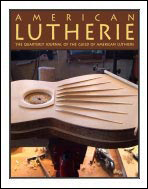 |
|
||||
 |
Meet the Maker: Kevin Aram by Cyndy Burton Here's the story of an English coal miner's son who got a chance to go to art school and has become a successful maker of fine classical guitars. And he digs Land Rovers. |
||||
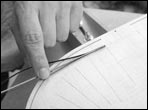 |
The Megas Touch: Violin-Style Purflings on Archtop Guitars by Jonathon Peterson Ted Megas likes to spend a lot of time alone in a shop full of large machines making exquisite archtop guitars one at a time. Our reporter gets into the Bat Cave to see how Ted does that super-tight pinstripe. |
||||
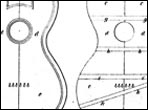 |
A Review of Three Old Lutherie Books with an Emphasis on Their Guitar Sections by Jan Tulacek, Alain Bieber, and James Buckland The American Lutherie Boom generation is just starting to appreciate the work of the Old Boys who made all those pretty little Romantic guitars back before Torres changed everything. To help us get a little farther into their heads, here are detailed reviews of lutherie how-to books from 1828 (German), 1834 (French), and 1907 (English). |
||||
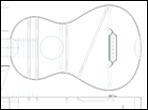 |
GAL Instrument Plan #63: 1825 Pons Ainé Guitar, Paris by James Buckland A maker, player, and scholar of 19th-century guitars, Buckland gives us a detailed drawing and helpful pointers as well as some interesting history about this pretty little guitar. It’s available as GAL Instrument Plan #63, neatly rolled in a tube. |
||||
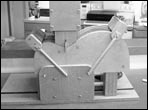 |
Charles Fox Benders, Old and New by Jonathon Peterson Charles Fox invented the Universal Side Bender back in the '70s, and now the majority of everybody uses some permutation of it. Charles recently had several new ideas about it and built a new version with some new features. He learned a lot in the process, and he shares it all with us. That's how the GAL works, folks. |
||||
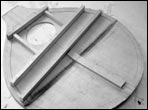 |
Mandolin Soundboards and Bracing from his 2008 GAL Convention workshop by Graham McDonald The mandolin is a world unto itself. Those cute little guys come in quite an array of configurations. At our most recent convention, Australian author and luthier McDonald showed us how to make flattops, archtops, and those things where a flat top has been folded down behind the bridge. |
||||
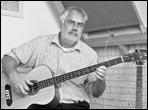 |
It's All About the Core or How to Estimate Compensation by Sjaak Elmendorp So we have all become used to the idea that the bridge of a guitar has to be set back to play in tune, and that some kinds of strings need more of that compensation than others. But what if the instrument you are building is an unusual design and you want to figure out where to put the bridge before you wreck it. If you've got math skills like Sjaak Elmendorp, you calculate it. If you don't, you use his handy tables to figure it out. |
||||
 |
Meet the Maker: Dan Kabanuck by Roger Alan Skipper Let's face it. The American lutherie crowd is not the most diverse collection of people you could imagine. Although I don't know if we'd have much luck picking a luthier out of a lineup, I do think most of us believe we could pick out the guy who is not a luthier. Meet Dan Kabanuck. He's the guy you would point at and say, “That guy is not a luthier.” Well, you might be afraid to point at him, actually. |
||||
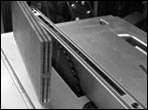 |
Cheap Machines: Table Saw by John Calkin Power tools are cheap these days. Does that mean they are a good bargain? Would you even want to use one of those fold-up units from the Home Depot store? Our curmudgeonly reviewer casts the cold, hard eye of experience upon one such saw and gives us a reality check. |
||||
| Questions edited by R.M. Mottola Questions and answers about charango plans; 190-proof alcohol; pre-nitro finish on Gibsons and Martins; plans for 'tater bugs and mandolas; and fret calculation math. |
|||||
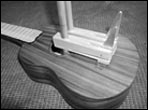 |
It Worked for Me by Fred Casey, Peter True, and Jean Francois Noel Good ideas about tiny cam clamps; gluing end blocks; and parchment paper... you know, that stuff Martha Stewart uses for baking cookies. |
||||
Web Extras |
|||||
